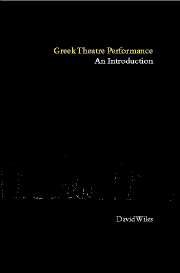1 - Myth
Published online by Cambridge University Press: 05 February 2015
Summary
SUBJECT MATTER
Mythos
According to Aristotle — and we agree there — narrative is the soul of drama. (Brecht)
For the philosopher Aristotle the life-spirit of a play was its mythos — a word we can variously translate as story, plot, narrative, myth or simply an act of speaking. I shall start this analysis of Greek theatre with its storytelling — the core skill that kept an audience on the front of its wooden seats through a long day. It is sometimes stated that Greek audiences knew the stories, and knew what was fated to happen. This is misleading. The myths of classical Greece were highly malleable, and the job of the dramatist was not to reproduce myths but to recreate them. Compared with today, there was more possibility of surprise for there were no reviews, no published texts, and plays were written for a one-off performance. There is also the simple fact that good theatre relies on suspense. The expert story-teller can hold a listener who has heard the tale many times before. Take this account of a scene by Euripides:
Remember how Merope in the tragedy raised her axe against her son because she mistook him for his own murderer. When she cries: ‘This blow will cost you dearer than the one you gave!’ what uproar she causes in the auditorium, lifting them to their feet in terror, in case she does the boy an injury before the old man can stop her.
- Type
- Chapter
- Information
- Greek Theatre PerformanceAn Introduction, pp. 5 - 25Publisher: Cambridge University PressPrint publication year: 2000



